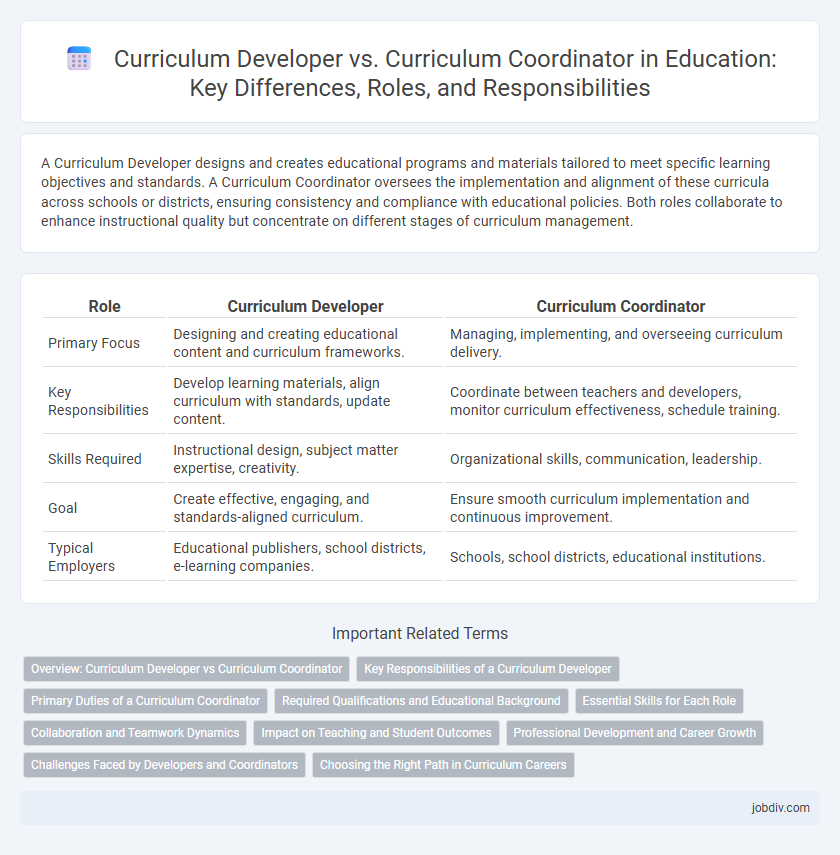A Curriculum Developer designs and creates educational programs and materials tailored to meet specific learning objectives and standards. A Curriculum Coordinator oversees the implementation and alignment of these curricula across schools or districts, ensuring consistency and compliance with educational policies. Both roles collaborate to enhance instructional quality but concentrate on different stages of curriculum management.
Table of Comparison
| Role | Curriculum Developer | Curriculum Coordinator |
|---|---|---|
| Primary Focus | Designing and creating educational content and curriculum frameworks. | Managing, implementing, and overseeing curriculum delivery. |
| Key Responsibilities | Develop learning materials, align curriculum with standards, update content. | Coordinate between teachers and developers, monitor curriculum effectiveness, schedule training. |
| Skills Required | Instructional design, subject matter expertise, creativity. | Organizational skills, communication, leadership. |
| Goal | Create effective, engaging, and standards-aligned curriculum. | Ensure smooth curriculum implementation and continuous improvement. |
| Typical Employers | Educational publishers, school districts, e-learning companies. | Schools, school districts, educational institutions. |
Overview: Curriculum Developer vs Curriculum Coordinator
Curriculum Developers design and create educational content, focusing on aligning learning materials with academic standards and student needs to enhance instructional quality. Curriculum Coordinators oversee the implementation of these curricula within schools or districts, ensuring consistency, compliance, and supporting teachers through training and resource distribution. Both roles collaborate to improve educational outcomes, with developers emphasizing content creation and coordinators concentrating on execution and evaluation.
Key Responsibilities of a Curriculum Developer
A Curriculum Developer designs and creates educational programs by researching content standards, analyzing student needs, and integrating instructional strategies to enhance learning outcomes. They collaborate with subject matter experts and educators to develop course materials, assessments, and teacher guides aligned with academic goals and compliance requirements. Their role emphasizes innovation in curriculum design, ensuring the content is relevant, engaging, and adaptable across various learning environments.
Primary Duties of a Curriculum Coordinator
A Curriculum Coordinator primarily oversees the implementation and evaluation of instructional programs across schools, ensuring alignment with state standards and educational goals. They collaborate with teachers to integrate curriculum content, provide professional development, and monitor student performance data to improve teaching strategies. Their role is essential in maintaining consistency and quality in education delivery within a district or school system.
Required Qualifications and Educational Background
Curriculum Developers typically require a master's degree in education, instructional design, or a related field, alongside experience in curriculum planning and assessment strategies. Curriculum Coordinators often hold a bachelor's or master's degree in education or educational leadership, with skills in managing curriculum implementation and teacher support. Both roles demand strong knowledge of educational standards, curriculum frameworks, and proficiency in data analysis to enhance student learning outcomes.
Essential Skills for Each Role
Curriculum Developers excel in instructional design, content expertise, and educational technology integration to create effective learning materials. Curriculum Coordinators demonstrate strong organizational skills, communication, and team leadership to oversee curriculum implementation and ensure alignment with academic standards. Both roles require data analysis abilities to evaluate and enhance curriculum effectiveness.
Collaboration and Teamwork Dynamics
Curriculum developers and curriculum coordinators play distinct yet complementary roles in educational settings, with developers focusing on designing innovative instructional materials and coordinators ensuring their effective implementation across teams. Their collaboration hinges on continuous communication, shared goals, and mutual feedback to align curriculum content with institutional standards and student needs. Strong teamwork dynamics foster a cohesive environment where curriculum quality is enhanced through diverse expertise and coordinated efforts.
Impact on Teaching and Student Outcomes
Curriculum Developers design comprehensive educational programs by integrating standards and instructional strategies that enhance teacher effectiveness and improve student achievement. Curriculum Coordinators oversee the implementation of these programs, ensuring consistency and providing professional development to support teachers in adopting best practices. Both roles directly influence teaching quality and student outcomes, with Developers shaping content and Coordinators facilitating its practical application in classrooms.
Professional Development and Career Growth
Curriculum Developers design and update educational programs, emphasizing the creation of innovative content to meet evolving academic standards, which enhances their expertise and opens pathways to senior instructional design roles. Curriculum Coordinators oversee the implementation and evaluation of curricula, fostering collaboration among educators and driving professional development initiatives that improve teaching effectiveness and leadership skills. Both roles contribute to career growth by expanding knowledge in pedagogy, educational technology, and instructional leadership, positioning professionals for advancement in academic administration and training sectors.
Challenges Faced by Developers and Coordinators
Curriculum developers face challenges in designing content that balances educational standards with diverse learner needs, while curriculum coordinators grapple with implementing these plans across various classrooms and ensuring teacher compliance. Developers often encounter difficulties in integrating emerging technologies and interdisciplinary approaches without overwhelming educators. Coordinators must address logistical issues such as scheduling, resource allocation, and continuous professional development to maintain curriculum fidelity and improve student outcomes.
Choosing the Right Path in Curriculum Careers
Curriculum developers design and create educational programs, focusing on content alignment, instructional strategies, and assessment methods to enhance student learning outcomes. Curriculum coordinators oversee the implementation of these programs, managing teacher training, resource allocation, and compliance with educational standards across schools or districts. Choosing the right path depends on your strengths in either content creation and innovation or organizational leadership and program management within educational settings.
Curriculum Developer vs Curriculum Coordinator Infographic

 jobdiv.com
jobdiv.com